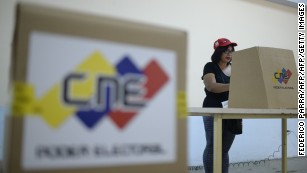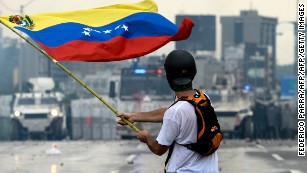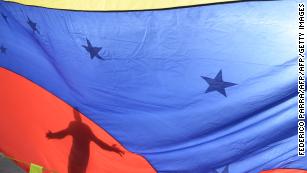CARACAS, Venezuela (CNN) — Polls opened in Venezuela on Sunday morning for the nation’s presidential election.
President Nicolas Maduro is seeking re-election for a six-year term in an electoral process that has been criticized both inside and outside Venezuela.
The main opposition coalition is boycotting the election, though Maduro is not without challengers.
Maduro’s chief rival in Sunday’s vote is Henri Falcon, a former state governor and onetime loyalist of the ruling party who broke ranks in 2010.
Amid allegations from leaders in the region that the election process lacks legitimacy, Maduro said the outcome will be respected.
“There has been a fierce campaign by the government of Donald Trump,” Maduro said in a news conference on Sunday. “In the United States there has been a fierce pressure to try to besmirch the Venezuelan elections — and they couldn’t.”
Maduro predicted a good electoral turnout and encouraged voters to head to the polls. “Today is a historic day. Let no one miss this historic day,” Maduro said after he cast his ballot, claiming his was the first vote of the day.
Polls close at 6 p.m. ET Sunday. Results are expected Sunday night or Monday.
Venezuelans head to the polls amid international outcry
The country has endured political tumult and economic misery, including food and medicine shortages, and hyperinflation.
“Nothing is normal,” said citizen Carmen Herrera. “The little bit of money that we earn is not enough to buy even half dozen eggs.”
“I would like to see a change because at this rate we’re not going to get anywhere.”
5 reasons why we should care about the crisis in Venezuela
Because of the deteriorating situation, an estimated 1.6 million people fled the country between 2015 and 2017, according to the International Organization for Migration.
Maduro has been Venezuela’s President since former President Hugo Chavez died in 2013.
Under Chavez, the country turned toward socialism. Many Venezuelans saw him as the hero of the poor. Before he died, Chavez picked Maduro as his successor, which helped put Maduro over the top in the 2013 presidential election.
Once he took power, Maduro kept up Chavez’s practices such as huge welfare programs and price controls for most goods, including food.
Marco Rubio: It’s time to hasten Maduro’s exit from power
Venezuela holds the world’s largest supply of crude oil — which once seemed like an endless gusher of cash for the government.
Plummeting oil prices crashed the country’s economy in 2016. It has since completely collapsed, and the country now finds itself in the middle of a financial crisis. The International Monetary Fund expects that inflation in Venezuela will reach 13,000% in 2018.
Falcon was once a Chavez supporter. In 2010, he broke with the ruling party and has been a vocal critic of the government in recent years. He believes the way out of the financial crisis is the dollarization of the country — pinning the country’s economy on the US dollar.
Many of those who are boycotting the election believe it is rigged. The event is an afterthought for so many citizens battling despair, fatigue and economic insecurity.
“Both my family and I are very undecided about whether we’re going to vote,” said Betty Fernandez.
According to the minister of communications, Jorge Rodríguez, speaking at a news conference Sunday morrning, more than two- and-a-half-million people had voted.




